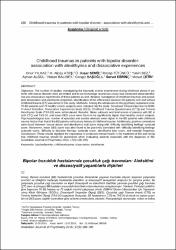| dc.contributor.author | Yılmaz, Onur | |
| dc.contributor.author | Ateş, M. Alpay | |
| dc.contributor.author | Semiz, U. Başar | |
| dc.contributor.author | Tutuncu, Recep | |
| dc.contributor.author | Bez, Yasin | |
| dc.contributor.author | Algül, Ayhan | |
| dc.contributor.author | Çetin, Mesut | |
| dc.date.accessioned | 2020-11-20T15:03:33Z | |
| dc.date.available | 2020-11-20T15:03:33Z | |
| dc.date.issued | 2016 | |
| dc.identifier.issn | 1302-6631 | |
| dc.identifier.uri | https://doi.org/10.5455/apd.188358 | |
| dc.identifier.uri | https://hdl.handle.net/20.500.12809/2743 | |
| dc.description | WOS: 000376663300005 | en_US |
| dc.description.abstract | Objective: The number of studies investigating the traumatic events experienced during childhood period in patients with bipolar disorder (BD) are limited and to our knowledge no previous study was conducted about alexithymia and dissociative experiences of these patients as well. Besides investigation of childhood traumas and associated dissociative and alexithymic properties, identification of the differences between BD patients with and without childhood trauma (CT) was aimed in this study. Methods: Among the admissions to the psychiatry outpatient clinic, 70 BD patients and 70 healthy control subjects were included into the study. Structured Clinical Interview for DSM-IV Axis-I Disorders, Dissociative Experiences Scale (DES), Childhood Trauma Questionnaire (CTQ) and Toronto Alexithymia Scale (TAS-20) were administered. Results: Mean subscale and total scores of patients with BD in both CTQ and TAS-20, and mean DES score were found to be significantly higher than healthy control subjects. Psychopathological acts, number of episodes and suicide attempts were higher in the BD patients with childhood trauma history than that of the BD patients without any history of childhood trauma. Additionally, positive correlations were found between 'sexual abuse' and alexithymia total score along with 'difficulty identifying feelings' subscale score. Moreoever, mean DES score was also found to be positively correlated with 'difficulty identifying feelings' subscale score, 'difficulty to describe feelings' subscale score, alexithymia total score, and episode frequency. Conclusion: These results highlight the importance of protective mental health in the treatment of BD and reveal that childhood traumas should be questioned when evaluating patients especially with the diagnosis of BD. | en_US |
| dc.item-language.iso | eng | en_US |
| dc.publisher | Cumhuriyet Univ Tip Fak Psikiyatri Anabilim Dali | en_US |
| dc.item-rights | info:eu-repo/semantics/openAccess | en_US |
| dc.subject | Bipolardisorder | en_US |
| dc.subject | Childhoodtrauma | en_US |
| dc.subject | Dissociation | en_US |
| dc.subject | Alexithymia | en_US |
| dc.title | Childhood traumas in patients with bipolar disorder: association with alexithymia and dissociative experiences | en_US |
| dc.item-type | article | en_US |
| dc.contributor.department | MÜ, Tıp Fakültesi, Dahili Tıp Bilimleri Bölümü | en_US |
| dc.contributor.institutionauthor | Semiz, U. Başar | |
| dc.identifier.doi | 10.5455/apd.188358 | |
| dc.identifier.volume | 17 | en_US |
| dc.identifier.issue | 3 | en_US |
| dc.identifier.startpage | 188 | en_US |
| dc.identifier.endpage | 195 | en_US |
| dc.relation.journal | Anadolu Psikiyatri Dergisi-Anatolian Journal of Psychiatry | en_US |
| dc.relation.publicationcategory | Makale - Uluslararası Hakemli Dergi - Kurum Öğretim Elemanı | en_US |


















